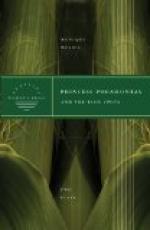“Captain!” he exclaimed, “but it is indeed a happy day that bringeth thee back to us, not but that some of them yonder,” and he pointed significantly towards the government house, “will think otherwise.”
The Indians in the meantime were looking about them with eager curiosity as they strode through the palisades into the fort. It was but a poor affair, judged by European military standards, and absolutely worthless if it should have to withstand a siege by artillery. But to the savages it was an imposing fortress, the very laws of its construction unknown to them, even the mortar between the logs, a substance of which they had no comprehension. Over the bastion as they emerged on the other side they beheld the English flag floating. This they took to be some kind of an Okee, in which opinion Smith’s action confirmed them, for taking off his hat, he waved it in delight towards the symbol of all that was now doubly dear to him.
But it was the guns which claimed the chief attention of the savage visitors. There were four of them, all pointing towards the forest, iron culverins with the Tudor Rose and E.R. (Elizabeth Regina) moulded above their breeches.
“Are these the fire-tubes of which we have heard?” asked Copotone eagerly, longing to feel them, but not daring for fear of unknown magic.
“Aye,” answered Smith, “art thou strong enough to carry one to Werowocomoco?”
The Indians looked them over appraisingly, wondering if they could drag them through the forest.
“Set the match to this one, Dickon,” commanded Smith with a grim smile. “It behooves us to frighten well this escort of mine, or they would be trying to carry off one of my iron pets here to a strange kennel.”
Dickon took up a tinder-box that lay on the bench beside him, and in a moment under the fixed gaze of his audience struck a light and applied it to the flax at the breech. There was a flash, then a loud report, and the Indians, as if actually hit, fell to the ground, where they stayed until they gradually convinced themselves that they were unhurt.
“If ye had been in front instead of behind ye had been killed,” Smith said solemnly, desiring to impress them with the terrors of the white man’s magic.
The Indians got to their feet and, though they said nothing, and did not attempt to run, John Smith knew that they were more terrified than they had ever been in their lives.
“Come,” he said, leading the way from the fort to the town. “Since ye find our guns too heavy and too noisy I will seek more suitable presents for Powhatan and for you.”
The colonists, roused by the cannon shot, had run out from their doors to see what had happened. They could scarcely believe their eyes, and it was not until Smith called to them by name and questioned them in regard to the happenings at Jamestown since his departure, that they were convinced he was himself. All were thin and gaunt, and they peered hungrily at the baskets of food the Indians bore. Most of them greeted Smith with genuine pleasure; others there were who frowned at the sight of him, who barely nodded a welcome, who answered him surlily and who got together in twos and threes to talk quickly as he passed on.




